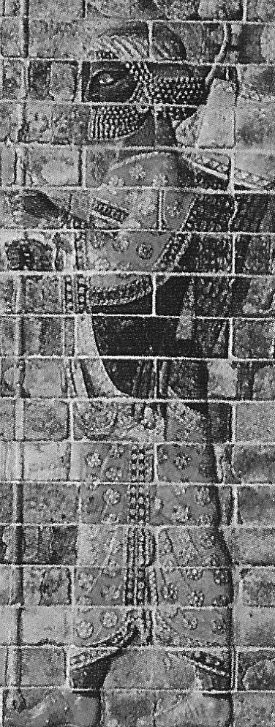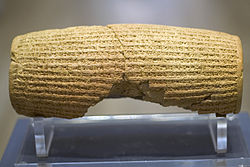Memo to Cyrus: God Sees, God Cares
By Neil Earle
 Cyrus never knew that he was carrying out the will of God.
Cyrus never knew that he was carrying out the will of God.In chaotic times such as pandemics and wild and woolly politics both national and international in which we are currently enmeshed, it might be easy for some to assume that God has gone way off somewhere or if he exists, he doesn’t care anymore, or maybe there just isn’t a God anyway.
We are not the first people to think that way.
In the time of the prophet Isaiah in the late 700s BCE when the nation was uprooted and living in exile far from their native land, the Creator God noted their complaints: “Why do you say, O Jacob, and speak, O Israel, My way is hidden from the Lord, and my just claim is passed over by my God” (Isaiah 40:27). Later on the prophet Ezekiel exposed the tragic shortsightedness of those hell-bent on doing evil: “…the land is full of bloodshed and the city full of perversity for they say, ‘The Lord has forsaken the land, and the Lord does not see’” (Ezekiel 9:9).
A Gentile Messiah!
Let’s see how this works from the words of these very same stalwarts known as the Major Prophets of Israel. “The prophets were amazingly well-informed,” said historian Paul Dionne of the University of Toronto. None more so than the man we call Isaiah whose 66 sprawling chapters make up one of the longest books of the Bible. John F Sawyer calls Isaiah “the fifth Gospel” and this applies especially to the section from Isaiah 40 to Isaiah 45, which we could call the Cyrus Scriptures.
The background to Isaiah 40 to Isaiah 45 is that Judah is in national captivity in Babylon (586-539). Yet, still, Yahweh has not forgotten his people, as the very active careers of Daniel and Ezekiel show. “The Cyrus Scriptures” show that God is about to raise up a Deliverer for his people only it will come in a different way than the Jewish captives expect. It will come at the hands of a warlike Gentile king, Cyrus, King of Persia.
What is astonishing in Isaiah 40-45 is that the Lord God of Israel specifically addresses this famous empire-builder, first mentioned in Isaiah 41:25-27 as the “man from the east.” Cyrus was born into an obscure (at the time) tribe northeast of the Persian Gulf in modern-day Iran. After many harrowing escapes in his youth Cyrus will conquer Babylon, let the oppressed captives go free and eventually sponsor the Jewish return to Palestine. This is described in Isaiah 41:27 as “good tidings” (“basar” in the Hebrew) – the good news (Isaiah 40:9).
Cyrus established the Persian Empire, the most humane of the ancient world systems. A 10-inch barrel found in Babylon in 1879 (the Cyrus Cylinder) records which I have seen personally, confirms in general terms what is stated in 2 Chronicles 36:22. It reads in essence: Let every captive people return to their home and place and restore their ancient worship. In all this, Cyrus never knew that he was carrying out the will of God (Isaiah 45:4).
“My Anointed”
It is still somewhat astonishing in the context of Old Testament times that Yahweh, the Lord God of Israel, addresses this man Cyrus in the first person in terms no rabbi at the time could conceive: “Thus says the Lord to his anointed, to Cyrus, whose right hand I have held…I will go before you and make the crooked places straight…That you may know that I, the Lord, who call you by your name, I have named you, though you have not known me. I am the Lord and there is no other, there is no God beside me, I will gird you though you have not known me” (Isaiah 45:1-5).
This astonishing passage has been explained by more critical scholars of our day that it is a message written to Cyrus by another writer, one they call “Second Isaiah” who lived in the time when these events were happening, when Cyrus captured Babylon and sounded the note of deliverance, that even secular historians have seen as exceptional.
 The "Cyrus cylinder" records that captive peoples were allowed to return to their place of origin and restore their ancient worship.
The "Cyrus cylinder" records that captive peoples were allowed to return to their place of origin and restore their ancient worship.“My Shepherd”
Now we understand better why Yahweh calls Cyrus his shepherd, in Isaiah 44:28, a designation usually given to cherished kings such as David: “Who says of Cyrus, He is my shepherd and he shall perform all my pleasure, even saying to Jerusalem, You shall be built, and to the temple, Your foundation shall be laid.”
This is exactly what Cyrus did. His decrees attested by the Cyrus Cylinder was one of the earliest edicts of toleration in the ancient world. He allowed all peoples to go back to their land to worship their gods, as long as they prayed for him. A.T. Olmstead in his classic History of the Persian Empire remarks on Second Isaiah’s closeness to events; “Prophecies by a Jewish exile in Babylon so closely parallel the language of the proclamation that we wonder if he might actually have read it” (p. 55).
Thus even if Isaiah 40-45 is written later than the conservative dates usually given, it is astonishing for the accuracy of the Hebrew writers both to copy and reflect on the religious significance of what was happening under Cyrus and the Persians. The biblical prophets were recording events that Olmstead claims affect a good half of our Bible. Even Jesus and the early disciples spoke Aramaic, the language of the Persians, rather than Hebrew!
A Legacy of Faith
Yes, the Persians and Cyrus cast a long shadow indeed, administering the largest empire the world had seen at that time. Walter Brueggemann explains the larger lesson in all these historic events. Isaiah through and through, “is a summons to faith (7:9; 30:15) that insists that Yahweh be relied upon in every circumstance of this life, an offer of comfort in the midst of every crisis…. Yahweh is the primal player in the life of Judah and in the life of the world around Judah” (Isaiah 40-66, pages 1-7).
And, we might add, in the life of the world today. Oh yes, depend on it: God sees, God knows. He is able to work through the politics of this world and the world rulers to accomplish his ends. The power and the glory are God’s alone. That is a lesson all peoples will one day understand.